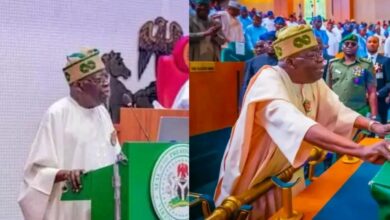Tinubu presents an N47.9 trillion budget to the legislatures

Nigerian President Bola Ahmed Tinubu has presented the 2025 budget to the National Assembly.
The budget, valued at N47.9 trillion, is the second budget the president has submitted since taking office in 2023. Tinubu described the budget as a package aimed at revitalizing the country’s economy.
“The development of the country and the provision of infrastructure are the backbone of this 2025 budget,” Tinubu stated.
The president outlined the budget allocations for priority ministries as follows:
- Security: N4.91 trillion
- Infrastructure: N4.06 trillion
- Health: N2.48 trillion
- Education: N3.52 trillion
The National Assembly passed the 2025 budget on Monday. The two houses of parliament, the Senate and the House of Representatives, will review the budget to make amendments before it becomes law.
“We will sit down and study it carefully to ensure that all sectors and ministries are treated fairly. If there are any issues, it is our responsibility to address them,” said Sale Soli Jibiya, a member of the House of Representatives.
Where will the budget funding come from?
Nigeria’s 2025 budget is based on an oil price of $75 per barrel, with expectations of over two million barrels of crude oil production in the coming year. President Bola Tinubu informed the House of Representatives that the government expects to generate N34.82 trillion in revenue to fund the budget.
Tinubu mentioned that the budget has a deficit of N13.08 trillion, or 3.08 percent of the overall budget. It is anticipated that the government will borrow N13 trillion from domestic and foreign sources to bridge the budget gap.
The N47.96 trillion budget reflects a 36.8 percent increase compared to last year.
What Tinubu said to the House:
“I am pleased to inform you that our government has made remarkable progress in presenting the 2024 budget, achieving 75 percent of our target in the first nine months of the year by generating revenue of N14.55 trillion. The Nigerian economy grew by 3.46 percent in the first nine months of 2024, up from 2.54 percent during the same period in 2023. Nigeria’s foreign exchange reserves currently stand at approximately $42 billion, providing a buffer against potential economic downturns.
Security is the backbone of our development. We have heavily invested in the military and police to ensure security throughout the country and to secure our borders. When we launched the infrastructure development fund, we believed that infrastructure is crucial for economic development.
We recognize that our people are our greatest asset, which is why we invest in education, health, and other areas of social welfare. We will never turn our backs on food production. That is why we support our farmers with funding and agricultural inputs to restore production value, ensuring that no Nigerian goes hungry.
Our country faces serious challenges due to corruption, bribery, and insecurity. These issues are not insurmountable; they can be addressed, but only if we unite in strength and resolve.”



